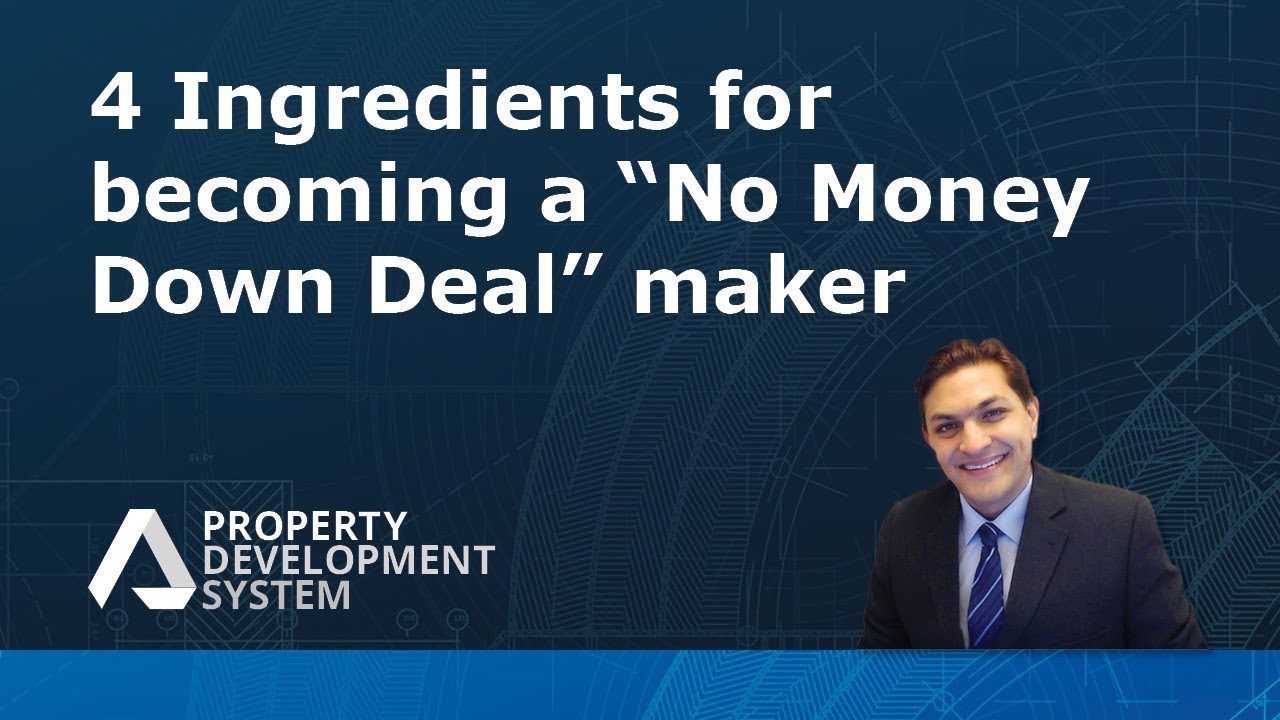4 Ingredients for Becoming a “No Money Down Deal” maker
The article focuses on the essential aspects and strategies necessary to become a successful deal maker without investing personal funds. It emphasizes ethical deal-making, prioritizing investors’ interests, and outlines the four crucial ingredients for creating no money down deals. Here’s a detailed analysis:
Ethical Approach
Ensuring the well-being of investors is paramount. The presenter stresses the importance of acting ethically and placing investors’ interests above one’s own. By providing more value and ensuring investors are benefiting, a deal maker can establish a foundation of trust and success.
Four Ingredients
Lifetime Deal
The first ingredient involves finding a ‘deal of a lifetime,’ characterized by significant profit margins that ensure all parties can make money.
Better Opportunity
Presenting a proposal that offers a better outcome for potential partners compared to their current situation is crucial. This involves understanding and leveraging the contrast principle to highlight the advantages of the deal.
Education
Informing potential investors about the deal-making process and the associated risks and rewards is essential. This education helps reduce fear and builds confidence in the project.
Reducing Fear
Overcoming inherent fears through education, transparency, and establishing trust is vital. Sharing knowledge and insights about the process can help potential investors feel more comfortable and informed.
Investor Journey
The video also delves into the investor’s journey from awareness to advocacy, emphasizing the importance of education, consideration, preference, and the action stages. Detailed and professional presentation of the project, due diligence, and a clear explanation of the benefits and risks can significantly influence investor decisions.
Trust and Credibility
Building trust and credibility with investors is a recurring theme. This is achieved by delivering on promises, providing transparent and detailed information, and ensuring the project aligns with what was initially proposed.
Frequently Asked Questions
How does the ethical approach towards investors influence the success rate of no money down deals?
Investor Trust and Confidence
By prioritizing investors’ interests and ensuring their financial well-being, deal makers establish a foundation of trust. This ethical stance not only fosters long-term relationships but also builds a reputation that attracts more investors. Trust is a crucial component in investment decisions, and ethical practices significantly contribute to gaining and maintaining this trust.
Sustainable Success
Ethical deal-making is not just about the immediate transaction but about creating sustainable success. By focusing on the investors’ returns and safeguarding their interests, a deal maker ensures a continuous flow of investment and support for future projects. This sustainability is vital for long-term growth in the real estate industry, where word of mouth and investor confidence can make or break a deal maker’s career.
Mitigating Risks
Ethical practices involve transparent communication about the risks and rewards of an investment. By being upfront about potential challenges and how they plan to address them, deal makers can mitigate fears and objections from investors. This transparency leads to more informed decision-making on the part of the investor and reduces the likelihood of disputes or dissatisfaction.
Investor Loyalty and Advocacy
When investors feel valued and see that their interests are genuinely prioritized, they are more likely to remain loyal and become advocates for the deal maker. This loyalty translates into repeated investments and referrals, which are invaluable for securing future deals. Investor advocacy also serves as a powerful marketing tool, as recommendations from satisfied investors carry significant weight.
In what ways can educating potential investors reduce their inherent fears and increase their willingness to invest?
Building Confidence
Education empowers investors by providing them with the knowledge they need to understand the intricacies of the deal. This understanding fosters confidence, as investors are better able to grasp the potential benefits and risks involved. When investors are confident, they are more likely to commit their resources to a project.
Demystifying the Process
The real estate and investment fields can appear complex and intimidating to those not familiar with them. By breaking down the process into understandable segments, deal makers demystify the journey, making it more accessible and less daunting for potential investors. This clarity can significantly reduce fear and hesitation.
Highlighting the Risk-Reward Ratio
Education involves not only showcasing the potential returns but also candidly discussing the risks. By comparing these risks with the rewards in an open and honest manner, investors can make informed decisions. This informed decision-making process is crucial for investors to feel comfortable and secure in their investment choices.
Establishing Trust
Through education, deal makers signal their commitment to transparency and their interest in the well-being of their investors. This commitment is key to building trust. When investors trust that a deal maker has their best interests at heart and is willing to invest time into educating them, the relationship strengthens, paving the way for future collaborations.
Creating Informed Advocates
Educated investors are not just participants; they become advocates for the deal. They possess the ability to articulate the value of the investment to others, expanding the network of potential investors through informed discussions and endorsements.
What strategies can be employed to effectively communicate the benefits and risks of a deal to investors?
Clear and Concise Presentation
Information about the deal, including its benefits and risks, should be presented in a clear, concise, and professional manner. Utilizing reports, graphs, and detailed analyses can help investors understand the potential returns and challenges. This clarity helps demystify complex investment concepts, making them more accessible.
Educational Approach
Taking the time to educate investors about the specifics of the deal, including the market analysis, potential outcomes, and strategic planning involved, is key. Providing educational materials or sessions can significantly help in bridging knowledge gaps and reducing fears related to the unknown aspects of the deal.
Honest Discussion of Risks
Candidly discussing the potential risks and how they are mitigated is essential for an honest investment relationship. This includes outlining worst-case scenarios and the strategies in place to address them. Being upfront about the risks not only builds trust but also prepares investors for any eventualities, reducing the potential for conflict later on.
Use of Comparisons and Contrasts
Leveraging the contrast principle by comparing the potential returns and risks of the investment with those of traditional investment opportunities can highlight the deal’s value. This comparison can make the benefits more tangible by placing them in the context of what investors are already familiar with.
Personalized Approach
Tailoring the communication to the individual investor’s level of experience, interests, and concerns can make the information more relevant and engaging. This personalized approach shows respect for the investor’s unique perspective and can lead to more meaningful discussions about the investment.
Transparent Communication
Maintaining an open line of communication throughout the deal process is vital. Investors should feel they can ask questions and receive honest answers. Regular updates on the project’s progress and any changes to the initial projections also contribute to an atmosphere of transparency and trust.
Utilizing Trusted Advisors
Encouraging potential investors to consult with their trusted advisors, such as financial planners, lawyers, or accountants, can also help. These professionals can provide a third-party perspective on the deal, further aiding in the investor’s understanding and confidence.
By employing these strategies, deal makers can effectively communicate the benefits and risks of a deal, fostering a relationship based on transparency and trust, which is crucial for securing investment and ensuring the success of the project.
Why is an ethical approach important in deal-making?
An ethical approach in deal-making prioritizes the well-being and interests of investors above the deal maker’s own interests. By focusing on ethics, a deal maker ensures that all parties involved benefit from the transaction, thereby building a foundation of trust, credibility, and long-term success.
What are the four crucial ingredients for creating no money down deals?
Lifetime Deal
Identifying a deal that offers significant profit margins for all parties involved, making it a highly valuable and once-in-a-lifetime opportunity.
Better Opportunity
Crafting a proposal that presents a more advantageous situation for potential partners when compared to their current circumstances, using the contrast principle to highlight benefits.
Education
Informing potential investors about the deal-making process, including the associated risks and rewards, to build their confidence and understanding.
Reducing Fear
Addressing and mitigating fears through transparency, education, and trust-building, making investors more comfortable with the deal.
How does educating investors play a role in the deal-making process?
Educating investors about the details of the deal-making process, including potential risks and rewards, is critical for reducing their fear and building their confidence in the project. By providing comprehensive information and insights, investors are better equipped to make informed decisions, which can lead to a more successful and mutually beneficial deal.
What is the investor journey in deal-making?
The investor journey in deal-making involves several stages from initial awareness to eventual advocacy:
Awareness
Introducing the investment opportunity to potential investors.
Consideration
Investors evaluate the opportunity, considering its benefits and risks.
Preference
Based on the information provided, investors develop a preference for the deal over other investment options.
Action
The final stage where investors decide to commit to the deal.
This journey underscores the importance of education, transparent communication, and detailed presentation of the project to influence investor decisions positively.
How can trust and credibility be built with investors?
Trust and credibility can be built with investors by consistently delivering on promises, providing transparent and detailed information about the deal, and ensuring that the project aligns with what was initially proposed. Demonstrating reliability and integrity in all interactions with investors is key to establishing a trustworthy relationship.
What significance does a 20% margin hold in deal-making?
A deal offering a developer margin of 20% is considered exceptional and highly profitable. Presenting deals with this level of margin is crucial as it highlights the value and potential return on investment, making the deal more attractive to potential investors.
Why is it important to contrast potential returns from deals against conventional investment opportunities?
Contrasting the potential returns from deals against conventional investment opportunities, such as bank deposits, is important because it showcases the deal’s value and profitability. Since conventional investments typically offer lower returns, highlighting the superior potential returns of the deal can attract investors looking for higher yields on their investments.
Test Your Knowledge
Multiple-Choice Questions on Becoming a “No Money Down Deal” Maker
1. What is the foundation of ethical deal-making?
A. Maximizing personal profits
B. Prioritizing investors’ interests above one’s own
C. Minimizing risk at all costs
D. Seeking the highest number of deals
2. Which of the following is NOT one of the four crucial ingredients for creating no money down deals?
A. Lifetime Deal
B. Immediate Profit
C. Education
D. Reducing Fear
3. How is a ‘lifetime deal’ best characterized?
A. A deal that provides ongoing profits indefinitely
B. A deal with significant profit margins for all parties involved
C. A deal that only benefits the deal maker
D. A deal that comes with no risks
4. What principle is utilized to highlight the advantages of a better opportunity?
A. The principle of scarcity
B. The contrast principle
C. The principle of reciprocity
D. The principle of commitment
5. The process of educating potential investors is crucial for:
A. Reducing operational costs
B. Increasing the deal maker’s profits
C. Reducing fear and building confidence
D. Shortening the investor journey
6. Which stage is NOT part of the investor journey outlined in the video?
A. Awareness
B. Negotiation
C. Preference
D. Action
7. Building trust and credibility with investors can be achieved by:
A. Promising high returns without proof
B. Delivering on promises and providing transparent information
C. Avoiding detailed explanations of the deal
D. Focusing solely on the deal maker’s benefits
8. What is the significance of a deal offering a 20% developer margin?
A. It is considered too risky
B. It is seen as below average
C. It is considered exceptional
D. It is standard for most deals
9. Why is contrasting potential returns from the deal against conventional investment opportunities important?
A. It demonstrates the high risk of conventional investments
B. It showcases the deal’s superior potential returns
C. It is a legal requirement
D. It discourages investing in the deal
Answers:
- B. Prioritizing investors’ interests above one’s own
- B. Immediate Profit
- B. A deal with significant profit margins for all parties involved
- B. The contrast principle
- C. Reducing fear and building confidence
- B. Negotiation
- B. Delivering on promises and providing transparent information
- C. It is considered exceptional
- B. It showcases the deal’s superior potential returns


